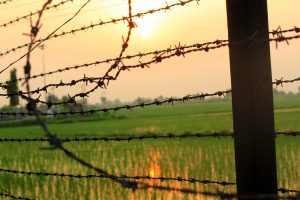As Narendra Modi takes office for a third straight term as India’s prime minister, neighboring Pakistan is watching closely to figure out what the next five years will mean for the two countries’ long-standing tensions, particularly over the issue of Kashmir.
The India-Pakistan relationship has been strained for decades, with the Himalayan territory of Kashmir at the heart of the conflict. During Modi’s last term, the Indian government implemented a constitutional process to reclassify the India-ruled state of Jammu and Kashmir as a union territory, giving the central government in New Delhi greater authority over the contested Muslim-majority territory. This move came after India revoked Article 370, which had granted special status and powers to the state.
In response, Pakistan downgraded diplomatic relations and suspended bilateral trade with India. Over the past few years, ties between the two countries have remained stagnant, with Pakistan maintaining that the onus is on India to create an environment for talks, linking any such initiative to restoration of Jammu and Kashmir’s special status. India, on the other hand, continues to insist that the Kashmir issue is an internal matter and that talks with Pakistan can only be held on the issue of cross-border terrorism, which it claims emanates from the Pakistani side.
Due to these hardened positions, a meaningful reconciliation appears to be currently out of reach for both countries. The Pakistani government has a lot on its plate already. The economic crisis persists and political challenges continue. At this stage, Islamabad cannot afford to publicly communicate a reconciliation message to India while simultaneously ignoring the revoked special status for Jammu and Kashmir.
India, on the other hand, does not seem inclined to compromise on the Kashmir issue or bring it up for discussion with Pakistan. As the Indian Foreign Minister Subrahmanyam Jaishankar recently stated, India is only concerned about finding a “solution to the issue of years-old cross-border terrorism” with Pakistan.
The issue of terrorism is a complex domain, with both India and Pakistan accusing each other of cross-border terror attacks. While India has long alleged Pakistan’s involvement in such incidents, Pakistan has recently tried to make the argument that it is the victim of India-supported terrorism. Recently, Islamabad presented a dossier alleging India’s involvement in an assassination campaign within Pakistan.
There is a likelihood that both countries will at least strive to avoid a renewed phase of tension, despite the rhetoric regarding Kashmir and terrorism.
Indian and Pakistani leaders exchanged congratulatory messages on social media following Modi’s swearing-in as prime minister, an encouraging sign that all is not lost between the two nations.
Pakistan’s Prime Minister Shehbaz Sharif and his elder brother, former three-time prime minister Nawaz Sharif, congratulated Modi on his party’s electoral success. Nawaz Sharif’s message expressed a desire to “replace hate with hope” and work toward the well-being of the people of South Asia. Modi responded by emphasizing India’s commitment to peace, security, and progressive ideas.
However, Prime Minister Sharif’s message to Modi was brief and cautious, indicating a wait-and-see approach from the Pakistani side. The possibility of any major and conclusive talks between the two countries in the near future seems remote, as the Modi government may not want to be seen as making concessions to Pakistan early in office, which could alienate its electoral base.
In Pakistan, there are several issues at play. The government will need to coordinate with the powerful military establishment to determine the country’s approach to reconciliation with India and what can be realistically put on the agenda.
It is worth noting that the ceasefire along the Line of Control that divides the Indian- and Pakistani-administered parts of Kashmir has remained in place for over three years, offering a glimmer of hope that further confidence-building measures between the two nations are possible.

































